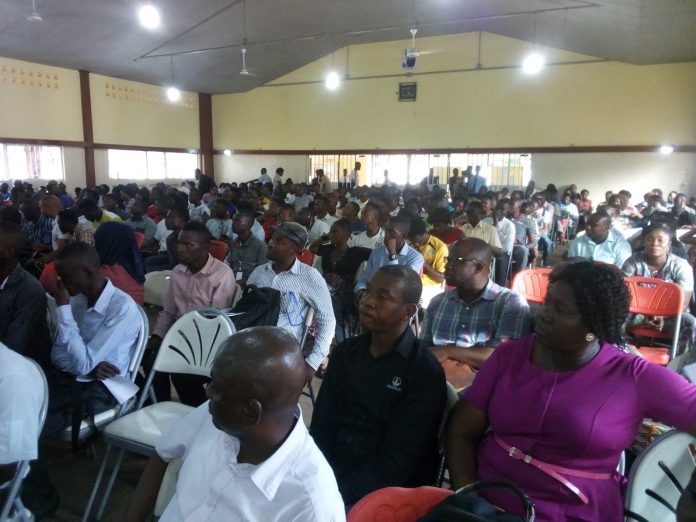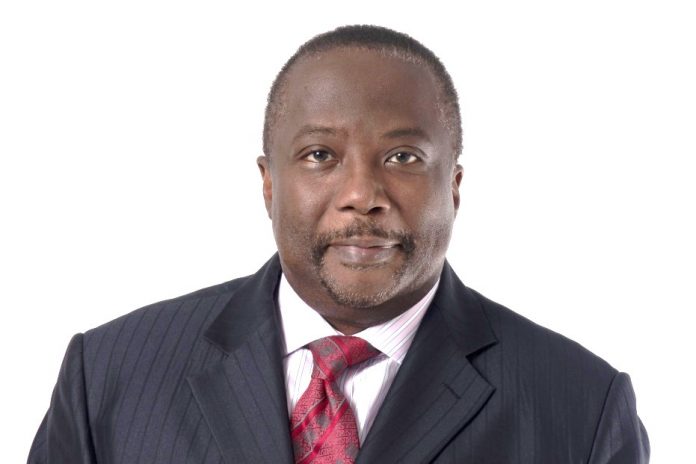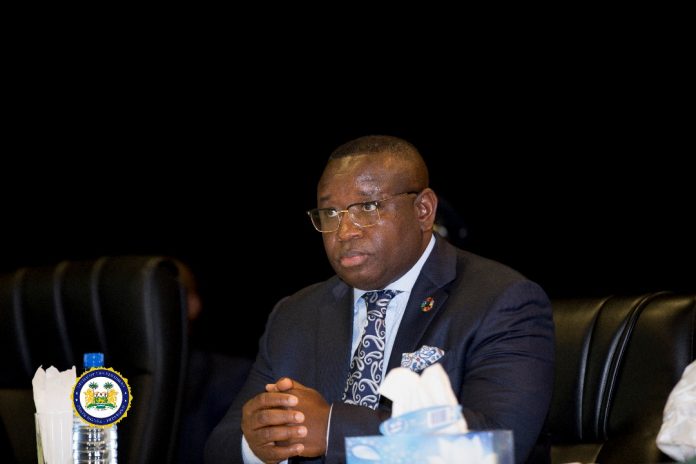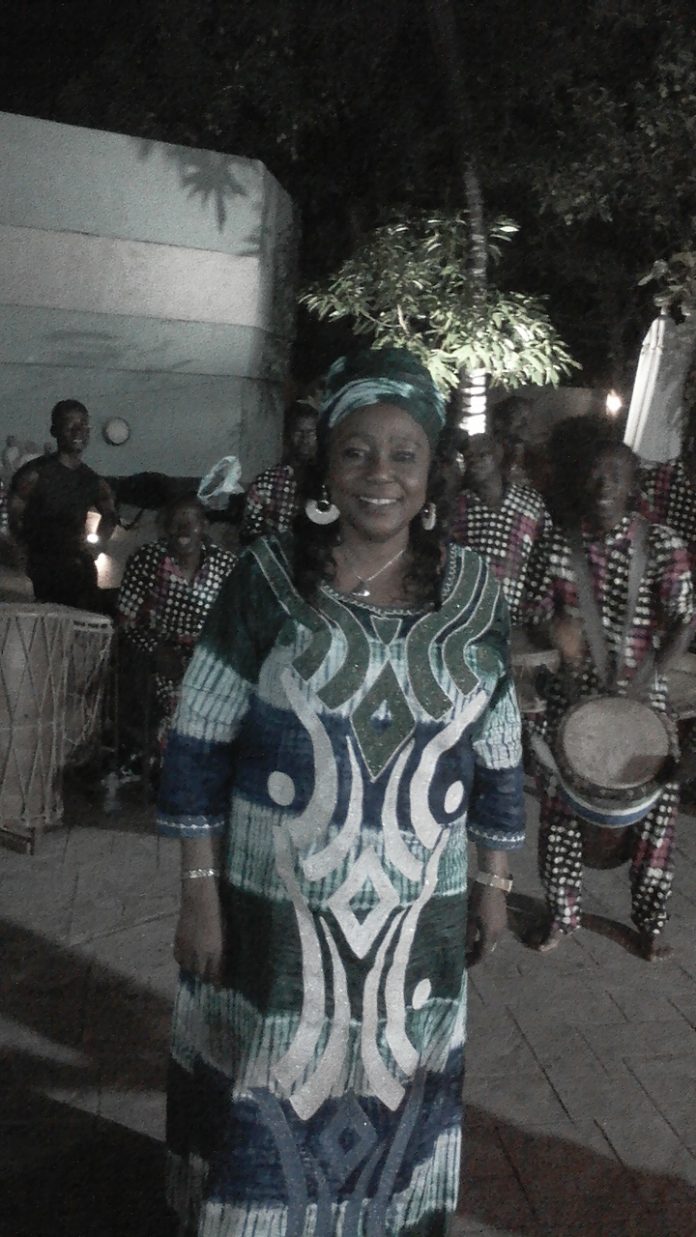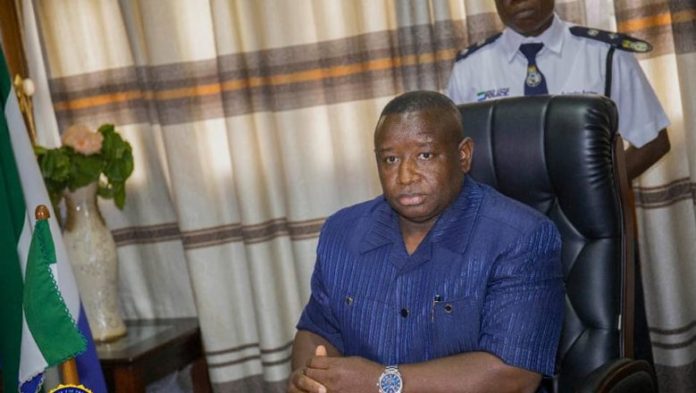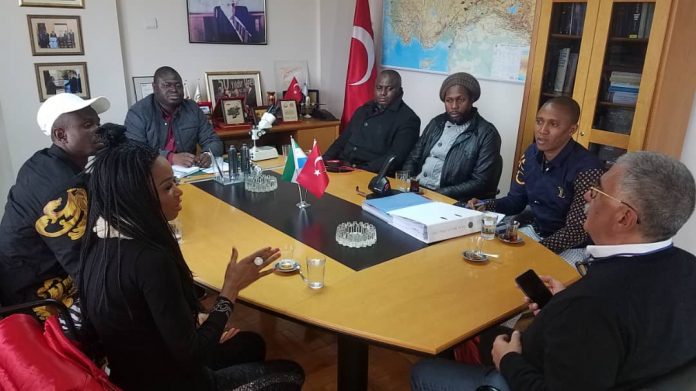The first Solade Adams Memorial Public Lectures was held on Wednesday 3rd April 2019 a the Milton Margai College of Education and Technology Polytechnic Great Hall, Goderich campus at which event the guest speaker, Dr. Victor Kabia articulated that the lecture is a brain-teasing analysis, that he is aware that his audience is made up of various learners including tutors and students and affirmed that the lecture would also create awareness about the successes and challenges in education.
Mr. Solade Adams was the first black and third Principal of the college from 1966-1980.
Dilating on the theme, ‘Means to an End: An Analytic Approach In Educational Practices,’ Dr. Kabia recalled that he was a student during the Principalship of the late Solade Adams in the 1970s, observed that the level of education in the country has changed dramatically but cautioned that we must cope with the environment we find ourselves, highlighted the benefits of the lectures and the factors that influence the means to an end, described psychology as any action to achieve the purpose to an end asserting that all factors in life are a means to an end and that education is to make students better citizens in society.
Dr. Kabia went on to enlighten that tutors/curriculum developers are faced with the problem of what to teach, that tutors must be committed to learners, recalled the recent massive failures in the country, the reason government established a commission of inquiry, underscored that teacher training is very important and continued that there are five points that affect education: what the learner brings to the learning environment, the learning environment itself, what is taught, the teaching and learning process and outcomes all of which are a means to an end.
“Teaching and learning is a team work. I have been involved in several efforts to reform the educational system in the country. To make good teachers, the authorities also have the opportunity to support teachers to give of their best. Also, over the past six years, girls have performed well than boys in the West Africa Examination Council and even in science subjects,” he asserted.
Dr. Kabia said a curriculum is the major aspect of learning and that learners must be involved in its development emphasizing that a syllabus is a smaller unit of a curriculum and underscored that a curriculum must be in line with the objectives of learning and observed that the means to learning is graduation.
He said other factors that affect education are the homes from which students come, the political will of the state, talents from God, that in some cases some learners refuse to accept teachers by refusing to learn for which he suggested the following:-that learners must acquire information, proffer logical reasons, present materials, that knowledge comes in units, that it is the duty of learners to be responsible and that both the learner and tutor must develop positive attitude.
Dr. Kabia furthered that the lethargy by students to read as well as organize and store materials are responsible for the massive failures in public examinations and warned that to study is not to memorize as the brain is like a store and went on, “anything could be taught no matter the state of the learner. The issue is the presentation that should be at the level of the learner.”
Among others, Dr. Kabia said a curriculum is divided into three:-knowledge, attitude and skills and lamented that examination malpractices are the road to a bleak future for the country reiterating that reading helps in communication, that students must learn to be competent and independent, have working skills and get results concluding that Sierra Leone needs a strong national educational system if quality education is to be achieved.
Earlier in his welcome address, the Acting Principal of the college, Dr. Philip John Kanu said the event is another milestone in the history of the college and recalled recently when the Chief Minister, Professor David Francis commissioned the Solade Adams Public Lectures but that since then they have been looking for a competent person to deliver the first lecture.
He said Dr. Victor Kabia is an outstanding academic with longstanding reputation and encouraged students to ask salient questions after the lecture.
The moderator of the event, Dr. Victor Massaquoi, Commissioner, Tertiary Education Commission, said the public lecture is part of the continuous assessment of students, affirmed that the administration wants the college to return to its past glory, that the event is part of the college’s activities and informed that one of the recommendations of the principal, his administration and the College Council is to organize public lectures to give students the opportunity to interact with lecturers and professionals and highlighted that someof the benefits of the lectures are to maximize thework of students, an opportunity to become academics as well as help them to learn and apply skills.
Mrs. Elizabeth Taylor-Morgan, who introduced the guest speaker, said he is an academic icon who started lecturing at the college in 1986 and has played several roles in the college and the country including serving as Head of Department-Education, Vice Principal, Acting Principal, Chairman of the college’s Academic Board and now Chairman of the Polytechnic Council.
Highlight of the public lecture was the question and answer session.
Milton Margai College Ends 1st Solade Adams Memorial Public Lectures
Amb.Omrie Golley attracts more Investors
Omrie Michael Golley who was Sierra Leone’s former Ambassador to South Korea under the previous All Peoples Congress (APC) leadership of President Ernest Bai Koroma, has still not ceased, but continues to woo more investors to come and revamp the economy of Sierra Leone.
Ambassador Omrie Golley, who was sacked by the current Sierra Leone Peoples Party (SLPP) leadership of President Julius Maada Bio, has himself called on all political actors in Sierra Leone to work together to ease the political hate and tension in Sierra Leone.
Whilst dilating on ways to help the current Government for the very good of all Sierra Leoneans, the very renowned UK based lawyer, Ambassador Omrie Golley who is the current CEO/Chairman Board of Directors of Afric-Asia Asset Holdings Limited based in London, United Kingdom, said “notwithstanding the fact that there is a new Government, we must come onboard to improve the lives of the people.”
Ambassador Omrie Golley further said: “Those of us, who have small ways, should come onboard to help,” adding that through his Afric-Asia Asset Holdings Limited as key vehicle to engineer his lobby, he has been able to engage several investors from Kazakhstan, United Kingdom, Turkey and Guinea to come into Sierra Leone and see how they can revamp the economy. He said “I intend to bring more investors from Kazakhstan in the coming months.”
In addition, Ambassador Omrie Golley added that only by enticing potential investors to come and meet the people of Sierra Leone will interest them to come in and work to develop the country.
“I am determined to assist the Government of President Bio, and I believe the key to reviving the economy is through the private sector,” Ambassador Omrie Golley stated. He said, through private sector investment, he is keen on bringing investors to contribute in key areas of the economy, especially in areas like Agriculture, Fishing and Transportation. Thus, he said, already the idea of an improved cocoa production by providing incentives for farmers and assist in revenue generation for Government within the cocoa world.
Meanwhile, it could be recalled that in 2013, long before his appointment as Ambassador to South Korea, Ambassador Omrie Golley had already mobilized the sum of $54 million for the construction of a 15 story building here in Freetown which will comprise of an auditorium, car parking facilities together with office and residential units.
Also, during the Ebola outbreak, Ambassador Omrie Golley facilitated the sum $ 500,000 for the fight against eradicating Ebola. He also facilitated two separate cash and humanitarian donations of $ 300,000 and $ 100,000 by the Korean Government and by the Korean construction conglomerate respectively during the August 14, 2017 Mudslides and Flooding.
Through his quest in developing Sierra Leone in the Water Sector, Koica had also approved the sum of $1 Million grant towards to Sierra Leone for a water rehabilitation project. Ambassador Golley had also facilitated the Construction of the medical centre at Tokeh. He was instrumental in the development of progressive fishing policies between the Korean Government and the Government of Sierra Leone.
Ambassador Omrie Golley promised to reactivate his contacts by bringing onboard all of them through his Afric-Asia Asset Holdings Limited to ensure that all key players of Sierra Leone political system work together for the betterment of the people.
Ambassador Omrie Golley
Let Us Give President Bio and ACC A Very Big Hand
Corruption impacts most heavily on the poor and vulnerable members in society, but underdevelopment affects the future growth and prosperity of all people.
Thus, fighting on behalf of the disempowered and ensuring Sierra Leone’s development means that the responsibility for dealing with corruption falls squarely on all, from the Government and donors to civil society and citizens.
Corruption is a pervasive problem in both the developed and developing world. It is endemic in most African societies but is worst in countries where:
• Institutions such as the legislature and judiciary are weak;
• The rule of law is not strictly enforced;
• Political patronage is the norm;
• The independence and professionalism of the public and private sectors have been eroded; and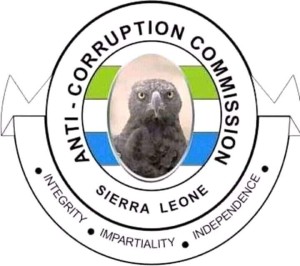
• Civil society lacks the means to hold perpetrators to account.
In recent years, the problem has gained much interest due primarily to a series of high level corruption cases in industrialized countries, an increasing awareness of the cost of corruption throughout the world and the practical and economic changes many countries are undergoing.
In Africa however, corruption is a development issue, as it is a crime against development, democracy, education, prosperity, public health and justice – what many would consider the pillars of social well-being.
While Government commits large sums to addressing the plethora of problems hindering development, corruption remains a major obstacle to achieving much needed progress. It is therefore imperative that anti-corruption measures form part of the country’s development agenda to ensure future growth and prosperity.
Corruption is defined as the abuse of entrusted power for private gain, in public and private sectors. Countries are scored based on assessments of the prevalence of bribery of public officials, embezzlement of public funds, kickbacks in public procurement, and questions about the effectiveness of public anti-corruption efforts.
Realizing the SDGs puts the effects of corruption in perspective. A bribe demanded by a teacher to enroll a girl at a ‘free’ elementary school could irreversibly block that girl’s education and future opportunities. A hike in the local cost of drugs might put treatment out of reach of sick people, leaving them unable to work and earn a living. Amounts paid as bribes are often quite small, but the implicit costs are great.
Where bribes are paid, there is a lower literacy rate. Bribery is also associated with higher maternal deaths, regardless of the country’s wealth or how much it invests in health.
The effects of bribery and kickbacks in the education, water and healthcare sectors represent the implicit costs of corruption. These incidents transform corruption into a “regressive tax” on services that the poor cannot afford, making basic services unattainable.
Thus, it is the poor and vulnerable who suffer most due to corruption as they are more reliant on Government services and public systems to satisfy their most basic needs.
In addition to the bribes that are demanded of those who cannot afford them, corruption results in the deviation of funds intended for development and undermine Government’s ability to provide basic services. It also undermines the rule of law, feeding inequality and injustice, discouraging foreign investment, further impeding development.
A lack of transparency, integrity and accountability is related to economic under-performance and fetters progress toward poverty eradication.
In addition to the implicit costs of corruption due to bribery, there are also hidden costs associated with corruption. The costs of a form of corruption termed “quiet corruption” by the World Bank, adversely affect the poor in particular.
The World Bank’s Africa Development Indicators 2010 shows that civil servants’ failure to deliver Government-run health, education or agricultural services, further jeopardizes Africa’s long-term development.
A holistic approach to the problem of corruption includes a comprehensive array of anti-corruption strategies ranging from good governance and structural reform to the participation of civil society.
Its four pillars – prevention, criminalization, asset recovery and international co-operation serve to promote open, honest and efficient decision-making, fair competition and ethical procurement systems, supporting effective Government development strategies.
Alleged Two Police Saboteurs Arrested at State House
In an unpalatable development two Police Officers deployed at State House were arrested on the grounds of circulating a sensitive outcry on the Social Media regarded to be very inciting.
The Sierra Leone Police have therefore opened an investigation into alleged corruption and welfare complaints by State House secret services and bodyguards. According to Police Head of Media, Brima Kamara, they received a complaint in an audio recording claiming, “Presidential guards are not okay” with regards to their welfare.
“The Sierra Leone Police (SLP) has established beyond all reasonable doubt that the audio recording making the rounds is the handiwork of a few police officers who are bent on smearing the good image of the office of the presidency,” Brima Kamara said. Police officers, on condition of anonymity, allege that they are paid a meager Le70,000 as Daily Service Allowance (DSA) which is often not paid on time. “Our boss, AIG William Fayia Sellu, is not addressing our welfare concerns at State House,” they claimed.
They also accused some senior Police Officers of corruption and soliciting bribes for deployments at State House. “We have arrested two police officers and investigations are ongoing,” Kamara added. Police officers have been arrested and placed under formal investigation by the Criminal Investigations Department (CID) with the view to determining the veracity of all the claims highlighted in the audio recording and also finding out what precipitated the release of the audio to the public.
The Media and Public Relations Unit stated that want to reiterate that the SLP is a disciplined institution with well-established communication channels and redress mechanisms, which guide, direct, and address complaints emanating from personnel within the Force. Brima Kamara assured the public that all allegations of sabotage and corruption referred to in the audio recording are false and a misrepresentation of what obtained at the office of the presidency. Information from other police officers indicate dissatisfaction among other units of Police, who say they have legitimate complaints.
Some officers mentioned a tribal connection also afflicts State House security operations. “Issues raised in the audio will also be equally investigated,” Brima Kamara concluded. According to a senior official at State House they are currently conducting an internal investigation and President Bio has been briefed on the issue. Some state security bodyguards disclosed that it’s better and rewarding to work at the Office of the First Lady Fatima Bio than State House.
After 2019 Housemates Salone Reality TV Show… Celebrity Housemate Salone 2019 Comes Next
Housemates Salone TV Reality Show is hotly debated in various quarters, on the Social Media with individuals expressing divergent views as to how the participants are faring on, whether it was justifiable to evict some of them and predictions churned out as to who will ultimately emerge as winner to take away the covetous Le100,000,000 star prize.
The ongoing Reality TV Show, which will end in two weeks’ time, is becoming tense, very interesting and captivating as the clock ticks every moment.
In reality, it seems as if the House is on fire as the noise within the four corners, caused by the Housemates, sometimes becomes somehow deafening. At times it becomes irritating to viewers but with the intermittent interjections of jokes and ‘blasting’ at each other with name-callings, it finally turns out to be funny especially when it is interjected with singing, playing of games, story-telling and all sorts of craziness.
The crux of the matter is that all the Housemates are really trying to be humorous, trying to be considered effectively using strong language and to be seen displaying nudity that should be very captivating.
The show, as the organizers ,Africa Young Voices (AYV) Media Empire and Africell Lintel Sierra Leone, planned it should be tilted towards youth empowerment providing the level playing field for expression of God given talents and at the same time affording them the opportunity for the acquisition of new skills. That is why the participants are taken through various activities to build up their confidence and transform them into individuals who have been inspired.
In the case of the Chief Executive Officer of AYV, Ambassador Anthony Navo, the dream and passion to empower young people and elevate them in society inspired him to establish the Empire from which many talented young people have benefitted and are still benefitting. There could be no surprise why he was recently awarded so prestigiously as an outstanding personality and entrepreneur.
With Africell, giving support to the young who have entrepreneurial potentials and talents whether in the music industry, sports, education has been part of their Social Corporate Responsibility.
So for the duo, AYV and Africell, to team up and present for the first time the Housemates Salone Reality TV Show geared towards youth empowerment such must not be a surprise anyone.
As the competition continues to build momentum lobbying by fans of the Housemates for members of the public to vote for participants of their choice on Africell No 5500 via text messages is becoming more and more intense. As a matter of fact the names of the Housemates and their tag numbers are displayed on the footage of AYV Television Channel 34 which is airing the Show on a daily basis.
Reaching its climax the public is eagerly looking forward to who will become the youngest millionaire that will emerge from the 2019 Housemates Salone Reality TV Show.
In a related development, it was disclosed that after 2019 Housemates Salone Reality TV Show, the leaders in media and communication, the Africa Young Voices (AYV) Media Empire and Africell Lintel Sierra Leone will be launching another bigger bomb code named Celebrity Housemate Salone 2019 (CHMSL). Le300 Million will be at stake for this next show that will be championed by the two communications giants.
Indeed, AYV and Africell are taking the entertainment industry to another level in this country.
Satisfying Customers is close to NP’s Heart
The leading petroleum company in the country, National Petroleum- Sierra Leone Limited is known for being the first in terms of customer care. This is indisputable when thorough cognizance is taken of how Management is very keen in optimizing customer satisfaction in its service delivery on different fronts.
Members of staff of the company are very mindful of the fact that it is the customer that comes first and therefore needs the utmost attention always ensuring that transactions are conducted under a congenial atmosphere that result into a win-win situation. For this brilliant and managerial initiative the company has been making positive headways positioning to stand tall among other business entities in this part of the world.
With a capable and result-oriented ‘Team NP’, working collaboratively and assiduously, where even the cleaner is regarded as highly relevant there is bound to be positive outcomes and the company has mastered this by ensuring that synergy is enhanced.
One admirable quality that NP-SL Ltd possesses is working tirelessly and effectively using its contacts with oil producing countries in order to ensure that there is timely purchase and delivery of petroleum products to avoid shortages. It goes without saying that fuel, for example, could be a political commodity in the sense that fluctuation in its price would make a Government likeable or unpopular. When the price goes up then people blame the Government for that but if it goes down it is kudos for the political administration.
Its timely importation of petroleum products has earned NP high commendations from various quarters simply because it helps to cushion unrest and other forms of disadvantageous effects one of which is increase in transport fares, increase in the prices of certain commodities. The pro-activeness of the company invariably has a direct impact on poverty reduction in variable ways.
Some who may not be aware of the fact that NP-SL Ltd is wholly owned by Sierra Leoneans vis-à-vis the visibility of the company and how it is remarkably striving could find it hard to believe that it a truly indigenous company.
However, that remains the plain truth when it is learnt that it was Sierra Leonean 35 workers formerly working for British Petroleum (BP) who pulled together their end of service benefits to purchase shares which were used to establish NP, which today is a success story of an indigenous company, having branches in various parts of the country and in other four West African countries namely Liberia, Guinea, Ivory Coast and The Gambia. The company’s operations right across the spectrum is contributing towards revenue generation and job creation for many.
With gas as one its marketable products it was thought wise to be producing gas cookers, popularly known as NP Gas, which could be access at their different filling stations. According to investigation conducted NP Gas is cooking-friendly, safe and long lasting. It is going at an affordable price and many are going for it.
When reference is made to Local Content, which by law is a Policy, then NP-SL Ltd stands tall within that realm as nearly all its members of staff are Sierra Leoneans thereby making use of local talents everywhere they are operating. The Local Content Policy is indeed an engine of growth and NP is making full use of it.
Without any iota of doubt NP-SL Ltd is growing taller and taller as time goes by.
With 20 Thousand Arrivals in 3 Months… Tourism Takes Big Leap Forward
At a dinner held on Wednesday 3rd April 2019 at the Radisson Blu Hotel at Aberdeen, the Minister of Tourism and Cultural Affairs, Dr. Memunatu Pratt, disclosed that in barely 3 months, twenty thousand tourists have visited the country. This, she maintained, is due to her Ministry’s relentless efforts to woo the International Community to Sierra Leone backed by the political will of President Bio to rebrand the industry.
Addressing her audience, which was made up of personnels of airlines, Ministers of Government, Members of Parliament, a team of tourist journalists from the UK headed by Tim Henshaw, a Tourist Marketing Executive, distinguished guests and members of the Sierra Leonean Press, she stressed that tourism is the turnaround mechanism for the economic development of the country. Recalling the visit recently to the UK, she maintained that their engagement with other tourist bodies has resulted in the development of a keen interest in the touristic destination of Sierra Leone. She expressed satisfaction for the tourist Press, who are slated to tour for 9 days the various touristic sites of the country and tell the real story of Sierra Leone. She expressed hope for a conspicuous rise in the influx of tourists to the country after the reports of these experts. Sierra Leone, she said, is open for tourism.
In her own statement, Madam Fatmata Abe -Osagie, who is the Ag General Manager of National Tourist Board, described the gathering as historic as all the stakeholders of the industry are present. She expressed optimism for the growth of the industry with the cooperation of the stakeholders. She also recalled their visit to the UK, where they met and engaged Tim Henshall, the Chief Executive of Kamageo Africa Destination Marketing, of which his presence in the country with his team of journalists is a testimony of their desire to promote the industry in the international market. She admonished the team to make good use of the visit and see all the beautiful sites the country has to offer tourists.
Tim Henshall, in his brief statement, expressed appreciation to the Ministry and the Board for the invitation and hospitality showed them, adding that he is wide eyed and boiling with excitement to see what the country has to offer and will ensure he markets them appropriately. He promised a doubling of the tourist number soon.
The gathering was climaxed with cultural performance by the National Dance Troupe whilst dinner was served.


As Pres. Bio’s Clocks One-Year in Office… CGG Praises, Lambasts & Cautions SLPP Govt.
One of the most formidable Civil Society Organisations in the country, the Campaign for Good Governance (CGG) on the 3rd April 2019 rolled out a reflection or an assessment of President Julius Maada Bio’s one year in office which was yesterday 4th April 2019.
It took the form of reflecting on key governance trends, with a purpose to make governance better in Sierra Leone.
The Executive Director of CGG, Maecella Samba, first commended the launch of the free quality education programme, the alloca

tion of 21% of Government’s budget to education and the commitment to ensure that over 1.5 million school children benefit from this initiative.
“CGG however notes the concerns of inadequate text books to some schools and outstanding payment of school and examination fees as stipulated in the policy. CGG therefore calls on government to ensure the availability of requisite data to support the realisation of this programme,” she highlighted..
The CGG ED went on to state that they acknowledge Government’s scaling up of service delivery and poverty reduction investments in social protection and health services.
She again commended the bold steps in the fight against corruption mentioning the on-going Commission of Inquiry (COI) with an objective of examining the assets of senior Government officials who were in office from 2007 to 2018 in order to ascertain whether their standard of living were commensurate to their official emolument.
“We, however, implore Government to continue to make every effort to utilize the findings of the COI to institute governance and accountability reforms in public administration and service delivery,” she appealed.
Marcella, on behalf of CGG, noted the increased number of prosecutions of public officials and the recovery of corruptly acquired money to the tune of approximately twelve billion Leones (Le 12,000,000,000) as high markers of accountability in governance.
“We, however, call on the Government to go beyond the recovery of state funds and institute mandatory custodian and other punitive measures to end impunity,” she pointed out.
According her CGG reminds the government of its commitments to utilize recovered Government money to construct an ultra-modern diagnostic center as promised. She applauded the release of the Government Green paper for peace and social cohesion but called for de-politicisation of the process and for partisan sentiments to be avoided in peace engagements.
She said while they commend the President’s bold policy pronouncement to ensure safer communities for women and girls; executive directives to the judiciary on punitive measures against perpetuators without substantive parliamentary amendment of the law poses serious challenges and needs urgent review.
The ED revealed that they are calling for a more comprehensive approach that includes immediate review of the Sexual Offences Act, protection of victims of sexual violence and an amendment of the rules and processes relating to how victims give evidence and cross- examined in court.
According to her CGG is concerned about the over reliance on Executive Orders to make policy. “Sierra Leoneans can hardly quarrel with the problems these Executive Orders try to solve. What is worrisome is that Executive Orders do not build consensus, they diminish the power of the legislature, and are open to abuse,” she posited.
She said over the past year they noted several disagreements over parliamentary processes and those undermine parliamentary legitimacy and performance of its statutory function as the country’s supreme law making organ. “We call on Government to ensure the restoration of parliamentary due processes and sanity in parliamentary operations,” she added.
“We also call on the law enforcement agencies and the judiciary to scale up their independence from the political executive. CGG is worried that for the past one year, government has not reopened public discussions on the constitutional review process. We want to remind the government that constitutional review is an imperative recommendation emanating from the Lomé Peace Accord and the Truth and Reconciliation Commission (TRC). We urge government to recommence discussions around the constitutional review process.to further strengthen the peace and to consolidate democracy in order to create an open and transparent society.
We note citizens’ concerns over the depreciation of the Leones, rising cost of basic goods and their implications on the quality of life of Sierra Leoneans. We call on government to take remedial steps to reverse this situation.
Finally, we are concerned about the inequitable distribution of state resources. We note a negative trend that seems to be concentrating resources in certain areas; while insidiously incapacitating local government across the country to actualize their own development plans. In a multi-party environment concentrating resources in specific areas invariably disadvantages opposition party strongholds, building synergy with local councils for better service delivery is therefore of essence. We call on government to ensure a fairer distribution of state resources,” she concluded.
I WILL PROVIDE OFFICE SPACE AND TWO YEARS SALARIES FOR WORKERS … SAYS FORMER CONSUL
The executives, and elders of the Sierra Leonean Community in (SLCT) Turkey on Friday 29th of March 2019, paid a visit to Mr. Ozel, former Consul for Sierra Leone in Turkey, where they had fruitful discussions with the delegation. He told them that he was very much happy for the visit.
The former Consul for Sierra Leone in Turkey called on Sierra Leoneans living in Turkey to pressure the government to come and establish an Embassy in Turkey.
He told them that he is ready to help the Sierra Leone government with an office space, with furniture and two years salaries for workers who are going to be at the Embassy.
Mr. Ozel further said that he has been in this position for more than thirty (30) years. He was appointed by Captain Valentine Strasser to serve in that position. The current government wants him to continue serving in that position, but he told them categorically that he is no longer interested in that position considering his age.
He said that according to Turkish law, as long as the Turkish government has established an embassy in Sierra Leone, a Consul of that country is not valid any longer.
He said since being in this position, he has never received any salary from the Sierra Leone government, but always raising money for Sierra Leone governments from visa.
“I love Sierra Leone,” said Mr. Ozel”, stating that he has done a lot for the country, remembering when former President Koroma visited Turkey, when he engaged the Turkish governments for the Airline and other business partnership.
First Architecture Students Of Limkokwing University Unveiled

The unveiling which took place at the university Gallery took the form of design exhibition which started on the 28th March and ended on Friday the 29th March 2019.
Head of Faculty, Okanlawon Abraham Shina explained that
the reason why they did the exhibition is for Sierra Leoneans to see what their students have been doing for the past two years.
He said the journey was not an easy one, as the course itself is not meant for lazy people.
He pointed out that Limkokwing University is the first University in Sierra Leone to offer Architecture course.
“Sierra Leone is one of the most beautiful countries in the world, a country that is invested in nature and fantastic sea views and now you can imagine if all these nature is exploited what it will look like. Because of lack of Architecture, the country looks back on the old days.”
He spoke about the war among other issues that have pushed the country backward, hampering the course of urban development, but now they are talking about urban renewal.
“…the country is now redeveloping and we don’t have planners to plan how it will look like.”
He spoke further of how the University conducted feasibility studies, which is why it brought in such a course to help shape the country’s view and to develop its economy by attracting investors, which will prolong their stay and make them feel at home.
The students have been trained academically and professionally.
Abraham Shina said because Sierra Leone doesn’t have enough Architects, people are building in unplanned way thereby distorting the country’s looks.
“That is why we have this new student. By the time they go out, they will change the face of Sierra Leone generally. People are constructing houses without saving cost. They have been trained to save cost.
All the designs are done by Sierra Leonean students and I am proud of them all.”
Limkokwing University Program Leader, Ismail Rabluismail, explained that the university has three different programs; starting from diploma to degree and what the students demonstrated was done by the final year students.
Sulaiman Conteh encouraged the students as they are going out to carry out their duty and become the agent of change of local Architecture.
“Who ever thought you can do what you have done? You have to change that mind set. It will not be easy. Sierra Leoneans have negative thinking, you have to make that change possible, because the problem of Sierra Leone is not physical, it is psychological.”
He added that Sierra Leoneans are very intelligent people, they will believe and do what you tell them.
One of the final year students, Richard Akwnma-Eboja, described the course as a hard one.
Richard Akwnma-Eboja said he is not feeling good about the current Architectural design of Sierra Leone, adding that from what he has learnt; he will be a change maker.
“I am encouraging others to come out; they can do it not because of money but to put Sierra Leone on the map.”

